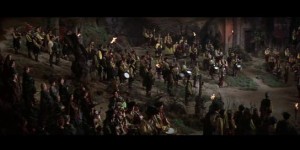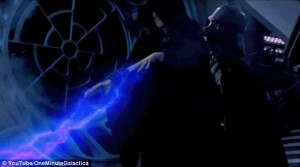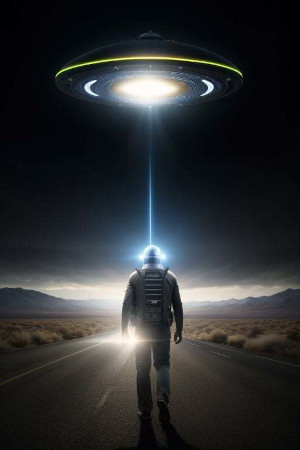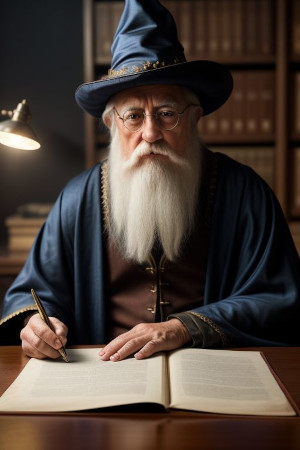2013
Sep
23
Ten Things that K-O my Suspension of Disbelief
It happens in film, I think, more often than in literature, but it infests all areas of storytelling in some way or another. You know the moment. Your suspension of disbelief is complete; you are immersed in a reality of someone else's making, having forgotten that there is a world outside also called reality. Then, it happens. A cold, dead fish slaps you in the face, and as you stagger backwards, someone grabs you by the ears, shakes you violently, and shouts, "This is a story!"
So you try to pull yourself from the cesspool of shattered dreams to integrate yourself back into the story, but it a vain struggle, because the reminder has already blasted you across dimensions. This is a story.
Your list of the greatest offenses may be different from mine, but that's OK. Regardless, let's try to leave them out of our writing, OK? These are in no particular order; they're all bad.
1. Those 555 phone numbers
Give me a break! I remember films old enough that they didn't worry about that. Perhaps they had enough unused exchanges that they could vary them around a bit; perhaps they just didn't care about using what either was or might be someone's actual phone number. I don't know. It's not like I'm going to start calling phone numbers I see in a movie, but that's not to say that someone won't.
It's better to not even show a number than to let a viewer see the deadly 555. Let them know a number is on a slip of paper; you don't have to say what it is. The same thing goes for addresses. Science fiction writers have an advantage here in that if a novel is set in the future, you can simply add a new street. Heck, you can do that if it's not science fiction. No one will know unless you make it something 555-ish like 1000 Nowhere Lane.
2. Kids showing up only when the plot calls for them
I like kids in real life, so maybe I notice them when they're missing. This is not so much of a problem in writing because you don't describe everyone walking down the street. On the other hand, if your scene takes place in a playground and there are no kids, you'll have eyes rolling. But in a film, a whole city street teeming with people, a park, a crowded shopping mall, all without any children is a flare-tipped shout-out.
 I was blessed enough to catch Brigadoon on Turner Classic Movies a few days ago. In that movie is a wedding. Now, Brigaddon, 200 years ago, was a thriving community. In the film, that was only two days ago, but you have to watch it to know what is going on. Interestingly, though the entire town showed up for the wedding, there wasn't a child in sight. I know; I had this post in mind at the time and looked for them. There were two girls that might have been, but they looked rather marriageable to me. Click on the image to the right and look for kids. I dare you. It's a good thing that this couple got married; they'd better get busy while there is still time for a next generation. Needless to say, this silly oversight slapped me in the face: This is a movie!
I was blessed enough to catch Brigadoon on Turner Classic Movies a few days ago. In that movie is a wedding. Now, Brigaddon, 200 years ago, was a thriving community. In the film, that was only two days ago, but you have to watch it to know what is going on. Interestingly, though the entire town showed up for the wedding, there wasn't a child in sight. I know; I had this post in mind at the time and looked for them. There were two girls that might have been, but they looked rather marriageable to me. Click on the image to the right and look for kids. I dare you. It's a good thing that this couple got married; they'd better get busy while there is still time for a next generation. Needless to say, this silly oversight slapped me in the face: This is a movie!
Maybe producers leave kids out because they add complications like on-set tutoring, but that very situation, too, is a reminder that you're watching a film. Finigan's Rainbow was on later that day, and their thriving community had real live children. It's doable.
3. 25-year-old high-school kids
This gets me as bad as -- or worse than -- no kids at all. I made a genuine attempt years ago to watch Beverly Hills, 90210, but I couldn't do it. I couldn't sit there and buy into the illusion that all of those supposed high school kids looked like they were doctors, lawyers, and high-class prostitutes. If a kid is supposed to be 15, it isn't probable that he has a 5-o'clock shadow at 10 am or is putting on a pound of Bond-O to cover up crow's feet. At least in Degrassi (which was actually good back in the days that it was Degrassi Junior High) they have kids that look like kids. Putting a mother of two into pigtails and naming her Pippi Longstocking doesn't cut it. It's even worse when the character is supposed to be a child and they make her into an adult, like Pocahontas.
Naturally, my griping so far refers to film and television, but literature can have exactly the same ailment: kids that either don't act like kids or who don't talk like kids. Unfortunately for my reputation, I can't think of an example where the author failed in this department, but some writers do better than others. And to help you out, and to make up for my not thinking of an example, I'll point you to a couple of posts on child and teen dialog by Lia London: Tween Talk and How to Speak Like a Little Child.
This is as good a time as any to throw in another plug for one of the candidates for my all-time favorite child in literature: "Peewee" Reisfeld. Sure, she talks like an astrophysicist and calculates orbital mechanics in her head. She's allowed to; she's a genius. But she also pouts, sasses, cries and pretends she didn't, and drags around her rag doll. She's a genius, but she's a child genius. Check out how Heinlein did a kid right.
4. Dragging out suspense until you're bored
Granted, it takes time to really build suspense. But don't you think that after the suspense is built you ought to do something with it? I'm thinking of a movie I watched. No, let me correct myself. It was a movie I started to watch, one that for a while I tried to watch. I don't remember what it was, and a quick web search didn't turn it up, but it involved someone trapped in a car in the woods, and of course there was one of those dime-a-dozen murderous maniacs out there running around. It got suspenseful as it should, and I waited ... it was still suspenseful, waited some more ... still suspenseful, waited some more...
"Good grief! Get on with the story, will you?"
Well, obviously, it's a story or you wouldn't have shouted that. In fiction, suspense works as a page turner to keep people reading. But if the reader turns the page and it's more of the same ... more of the same ... more of the same ... more of the same, the time will come when that reader just gives up. You get so frustrated that you finally pull out, telling yourself, "It's just a story. Forget it." Suspense is good if there is plot to go along with it, but by itself it's just annoying, and a constant reminder that a writer somewhere didn't do a very good job.
5. When scientifically or technologically impossible things happen
I think back to War Games. Overall, it was a great movie, even though artificial intelligence even now nowhere approaches the capabilities of Joshua. OK, for the moment accept that as part of the premise; you're allowed to do things like that in science fiction. No, that's not the part that got me. It was the sequence when David was first trying to hack in from his home computer. Do you remember all those virtual tunnels he navigated on screen, running into doors that said "Access Denied," and somehow blasting them all away? Sigh. He had an Imsai 8080. It had no graphics. If it did, it probably wasn't fast enough to calculate all that in real time, and you sure couldn't cram any kind of graphics through his 300-baud audio-coupled telephone modem. Instead of flashing "Access Denied," the screen should have been flashing, "Fiction ... Fiction ... Fiction."
That might have slipped past a lot of viewers at the time, but certainly not to anyone who actually owned an IMSAI 8080, or any other microcomputer based on a 4MHz 8-bit processor. Any kind of science fiction has to have a premise, and it is OK -- even desirable -- if that premise stretched beyond what we know. But in the parts of the "real" world that aren't part of the premise, you can't just wave your hands and make something happen because it looks good on screen.
Or on a page.
6. Insanely stupid superiors
You know all about these, and you hate them, right? I'm glad that Last Action Hero made fun of them rather than perpetuating the offense. The Chief of Police who refuses to recognize the evidence that is hammering him in the face. The General who won't believe that the line of tanks circling from the North is actually coming from the enemy to the north. The space mission commander who insists that just because the last 207 missions into the Forbidden Zone disappeared is no reason to believe that his will too. Furthermore, these fools keep screaming as though the volume will validate their ignorance.
In the real world, with a few notable exceptions such as politics, one does not rise through the ranks to a position of leadership by being consistently and stubbornly wrong. Asshole, yes, but not mentally incapacitated. Those loser idiot bosses might have been funny the first time, which I apparently missed, but they get old far too fast, and remain a constant reminder of a lazy writer. They're a trope we can all do without.
7. Characters doing things just because they advance the plot
You've seen this so many times that it's now a joke. There's a werewolf or a ghost or a chainsaw murderer on the loose, and some blamed idiot, usually a pretty girl, runs off on her own in some deep-seated compulsion to die. I saw The Birds again recently and was shocked to realize that even Hitchcock would fall to this foible.
OK, Melanie, let me get this straight. You are barricaded up in a house, the windows all boarded because killer birds are trying to get in. Even the fireplace is blocked off with furniture. You're terrified, so for some inexplicable reason, you grab a flashlight, creep upstairs by yourself, and go into a room from which there come strange bird sounds. Why the hell would you do that? Then, after seeing the birds, you go inside and manage to close the door behind you. Then, even more incredibly, you forget how to open a door, then stupidly drop to the floor just inside the door so that no one can open it from the other side. This isn't suspense, this is just pure unmitigated and astronomical stupidity. You deserve all the beak abuse you can get.
Daphne Du Maurier wrote the story, and Evan Hunter the screenplay. I don't know who to blame for that scene, but whoever is responsible gets 157 eye rolls. OK, perhaps Melanie needed to be traumatized by a bird attack, but there are those 157 ways that it could have happened aside from her doing something incredibly stupid that she would never do.
A character's actions should advance the plot, but they really need to be actions that the character would actually perform. If Melanie had already shown a propensity for fatal curiosity it might have made a little sense, but no. That wasn't her. She had no good reason to run upstairs with a flashlight, and she did it anyway.
Message to the reader/viewer: This is a story because nobody in real life is this dumb!
8. The No-The-Monster-Is-Not-Really-Dead ending
Oh, I hate this one and have ranted about it before. You know. They've managed to get to the car and escape the town full of little flesh-eating monsters, but don't know there is one hiding under the seat. They hopped aboard a moving freight car and left the zombies behind, but -- lo, and behold! -- one of them is infected and turning into one. The last of the aliens has been killed, but as the handful of survivors is trudging away, weary and soaked in blood, one more pops out of nowhere.
Give me a break!
I think this is a ploy used mainly by Hollywood to conceal the fact that the writer couldn't come up with a decent ending. Instead they try to shock the viewer so much that he fails to notice that fact. It might have worked the first dozen times you saw it, but now I can't think of anything more trite. It certainly no longer shocks. Oh, here we go again, the same old surprise ending you've seen in 100 other stories. I repeat: stories.
9. The deus ex machina
 This is such a classic faux pas that it shouldn't even need to be mentioned. Unfortunately, it does. We normally think of deus ex machina in regards to an ending, when something magical happens at the last minute to save the day. The cavalry comes unexpectedly over the hill. Some nerdy little scientist suddenly has a super-virus that will kill all the aliens (War of the Worlds has a bit of this). Darth Vader suddenly has a change of heart and kills Emperor Palpatine. (Yes, Star Wars junkies, I didn't take that too well.)
This is such a classic faux pas that it shouldn't even need to be mentioned. Unfortunately, it does. We normally think of deus ex machina in regards to an ending, when something magical happens at the last minute to save the day. The cavalry comes unexpectedly over the hill. Some nerdy little scientist suddenly has a super-virus that will kill all the aliens (War of the Worlds has a bit of this). Darth Vader suddenly has a change of heart and kills Emperor Palpatine. (Yes, Star Wars junkies, I didn't take that too well.)
But it need not be the ending. I recently finished a YA novel billed as teen horror and science-fiction, and which I really need to review soon. The protagonist finds herself in a dangerous situation when death, usually unpleasant, is imminent, whereupon she summons a power that neither she nor the reader knew she had and thereby saves herself. The first time it was a bit of an eye-roller, the third, something of a trend, and the seventh ... well, I think it was seven times; I actually lost count.
It's great when something unexpected happens; we all love a good plot twist. However, it should be something that while unexpected nevertheless makes perfect sense when the reader stumbles up on it, especially when a long list of clues suddenly falls into place. That's when you think, "Why didn't I see that coming?" I call those OMG! moments. It's much less satisfactory when the response is, "Where the heck did that come from?"
There are two moments in The Lastchild where I worry that I might not have set things up well enough for the reader before a surprise saves our heroes from doom. It's all clear enough to me, of course, but that doesn't count.
10. The sucky ending
By "sucky," I don't mean "unhappy." Very often an ending is unhappy, but it's still the right one, the one that had to be, the one that follows logically from the plot. Donnie Darko ended unhappily, but could it really have gone any other way? The Call of the Wild ended unhappily, but that was the logical culmination of London's entire message. A Tale of Two Cities ended unhappily, but then again, it didn't.
I think the psychology behind the sucky ending from the writer's perspective is almost the same as the No-The-Monster-Is-Not-Really-Dead ending. He wants to get in one last punch to make an impression, but when he does it, it's below the belt and entirely uncalled for. Instead of responding, "Wow!" the reader responds, "WTF?" I've ranted before about how Philip Pullman seemed to have gone out of his way to ruin the ending of The Amber Spyglass. I loved The Golden Compass up one side of the globe and down the other, but after finishing the trilogy I frankly don't care if I ever read anything of his again.
The sucky ending is the one that is so disquieting, so reprehensible, so wrong, that the only way for the reader to reconcile it is to utterly reject any suspension of disbelief she already had and remind herself that it was just a story, and one whose ending sucked. You throw away that involvement in another world, any identification with the characters, and any longing to pursue the world further because that is so much easier than grappling with what the author did to you.
Well, those are my pet peeves. I've even gone as far as to confess to where I might have broken one of them myself. So, what about you? Did I miss any that make you want to grind your teeth? Have you fallen prey to any of them in your own writing?
Addendum: 11. Nudity at the wrong times
I didn't think of this when I originally wrote this post, I suppose, because for me nudity in itself is neither here nor there. And although I'm writing this in the context of film, part of the issue affects books as well.
The point came to me a few days ago when BUtterfield 8 was on Turner Classic Movies. It starts out with a prostitute played by Elizabeth Taylor getting out of bed. She's undressed, so she carefully pulls the blanket close, then pulls it clear out of bed with her to walk into the other room. Nobody, prostitute or not, pulls a blanket out of bed to conceal him/herself in an otherwise empty apartment. If you have hang-ups like that, prostitution is probably the wrong field for you. She could have on a nightgown, and no questions would have been asked; why did they make her do something weird?
I've noticed this before when it comes to children in the bathtub. If at any time the camera is above the rim of the tub, we find that the child is taking a bubble bath. An awful lot of bubble baths in movies, almost all of them, it would seem. And if the child happens to be a girl, she has managed to cover herself in a thick blanket of bubbles up to her neck. I don't even know how they do that; they must mix up something special.
Real life is not like that.
Of course, some of us like to go the other way: throwing nudity in for shock value or to draw the lascivious crowd when it is neither relevant to the story nor what the character is doing. Either error reminds you you're watching film, but this is one I find in literature as well. What's that sex scene doing there? It just came out of nowhere. On the other hand, if a sex scene would be natural, the absence of one reminds me it's a story.
I realize that BUtterfield 8 and many other films from which I draw my experience were restricted by the ill-conceived Motion Picture Production Code in the US, so the producers had little choice, but the United States in general is really screwed-up about nudity. We put it in gratuitously when it's inappropriate, and make a big deal out of it when it's natural. That's probably one of the reasons I like European films. Less self-righteous BS.















Comments
by Robert on 2014 Feb 11
The funny thing about child nudity is that until roughly 30 yrs. ago in the USA at least, the visual media were much more casual about it; it didn't seem to "register" like adult nudity. But at the same time in real life in the USA and the UK, in many families, the use of bubble bath for children has become routine -- so much so that it really disappoints children when they can't have it, for instance because they're sensitive to it, hence my invention (US pat. 5,336,446; see link) of a bath foam that doesn't cause urinary or genital irritation but made very dense foam that really can block your view (see pix). So life and art went along parallel tracks in this regard. But I'm not as bothered by these faults generally because I'm always conscious of the art, and wouldn't want to "suspend disbelief" even if I could. Some of them do bother me as you, though, i.e. the ones where they seem to go out of their way to make things less realistic.
by Robert on 2014 Feb 11
The funny thing about child nudity is that until roughly 30 yrs. ago in the USA at least, the visual media were much more casual about it; it didn't seem to "register" like adult nudity. But at the same time in real life in the USA and the UK, in many families, the use of bubble bath for children has become routine -- so much so that it really disappoints children when they can't have it, for instance because they're sensitive to it, hence my invention (US pat. 5,336,446; see link) of a bath foam that doesn't cause urinary or genital irritation but made very dense foam that really can block your view (see pix). So life and art went along parallel tracks in this regard. But I'm not as bothered by these faults generally because I'm always conscious of the art, and wouldn't want to "suspend disbelief" even if I could. Some of them do bother me as you, though, i.e. the ones where they seem to go out of their way to make things less realistic.
You must be logged in to post a comment.